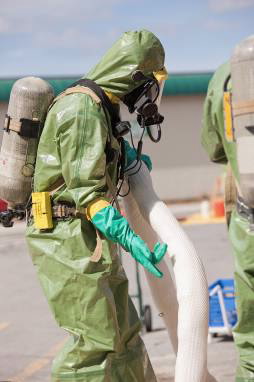FOR IMMEDIATE RELEASE
ACS News Service Weekly PressPac: January 30, 2013
Toward a better cyanide antidote for terrorist attacks and other mass casualty events
In an advance toward closing a major gap in defenses against terrorist attacks and other mass casualty events, scientists are reporting discovery of a promising substance that could be the basis for development of a better antidote for cyanide poisoning. Their report, which describes a potential antidote that could be self-administered, much like the medication delivered by allergy injection pens, appears in ACS' Journal of Medicinal Chemistry.
Steven E. Patterson, Ph.D., and colleagues at the University of Minnesota Center for Drug Design explain that the only existing antidotes for cyanide — recognized as a high-risk substance for potential use by terrorists — must be administered by intravenous infusion. That procedure requires highly trained paramedical personnel and takes time. Cyanide, however, is a fast-acting poison. In a situation involving mass casualties, only a limited number of victims could be saved. Patterson's team thus sought an antidote that could be administered by intra-muscular (IM) injection, a simpler procedure that could be administered rapidly to a large number of victims or even be self-administered.
Their report describes discovery of a substance, sulfanegen TEA, “which should be amenable for development as an IM injectable antidote suitable for treatment of cyanide victims in a mass casualty setting. Further development, including efficacy in lethal cyanide animal models, will be reported at a later date.”
The authors acknowledge financial support from the National Institutes of Health through the National Institute of Neurological Disorders and Stroke (award #UO1NS058087-05).
![]()
Contact
Science Inquiries: Michael Woods, Editor, 202-872-6293
General Inquiries: Michael Bernstein, 202-872-6042

be used to create a better antidote for cyanide
poisoning by terrorists.

